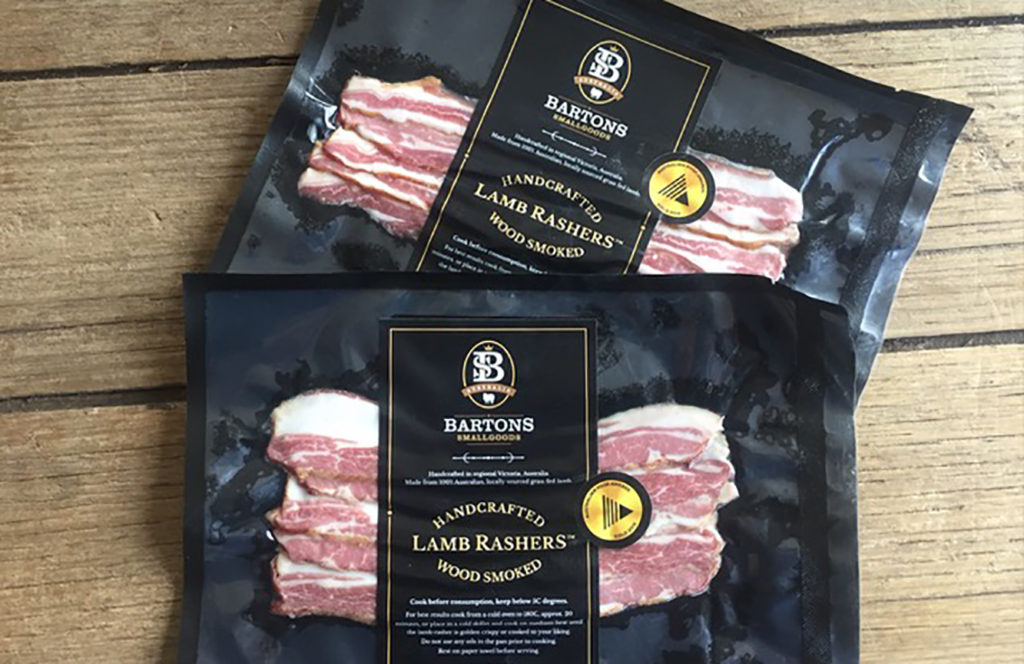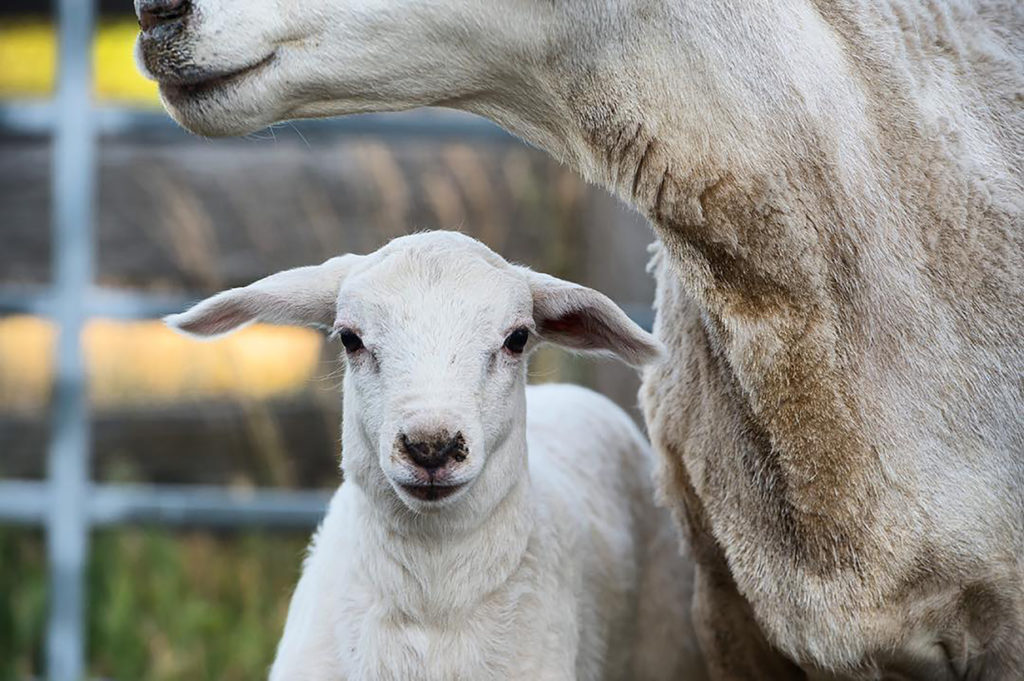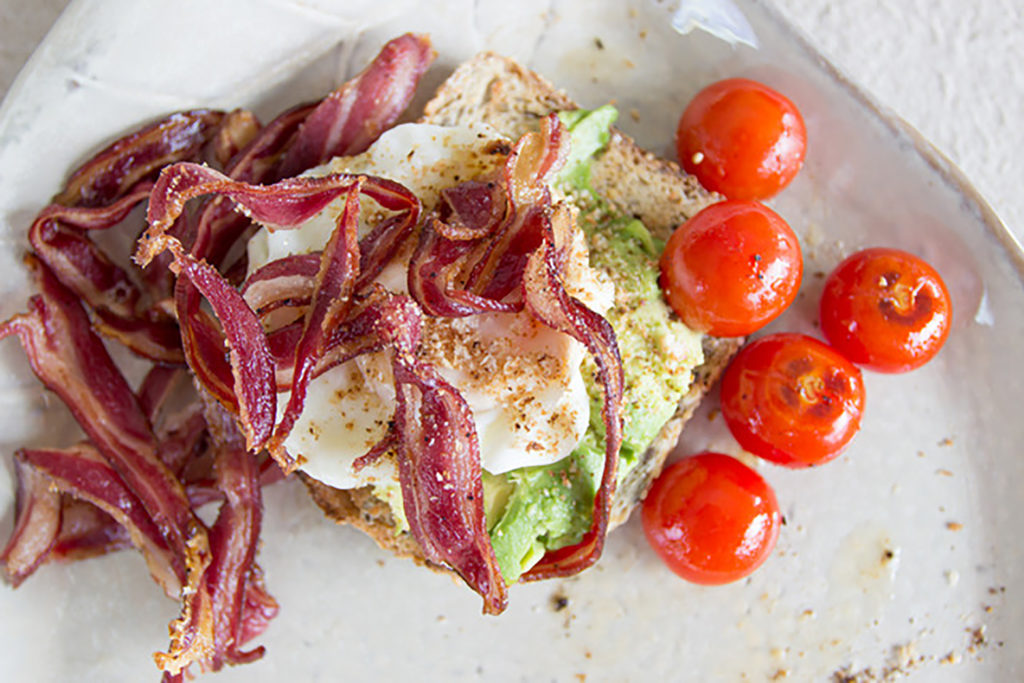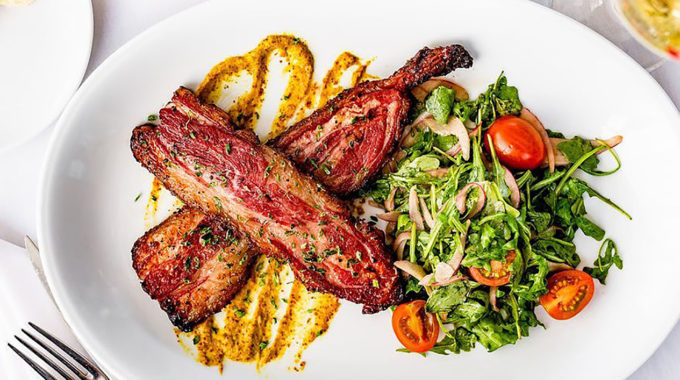Lamb Bacon: all taste, no waste
There’s bacon… And then there’s Lamb Bacon. Central Victorian sheep farmer Toni Barton developed the idea of making bacon from lamb in 2016 in a bid to value-add to each lamb cut from her property. She hit upon the concept during a butchering masterclass she was hosting at her farm. As the butcher running the class was demonstrating how to cut up a lamb carcass, he held up the lamb flank (belly) and said, “If this were a pig, this part would become bacon”. Barton calls it her “lightbulb moment”.
Barton immediately sent off a flank to her friend, barbecue expert Jon Bell, who knows all about smoking and curing meat. When he sent back his results, Barton knew she was onto a winner. Initially, she took five kilograms of her Lamb Bacon to sell at a local market, and immediately sold out. The same thing happened when she brought 10 kilograms to market, then 25… Lamb Bacon was an instant smash with consumers.

Successes and setbacks
It hasn’t just been a hit here in Australia. The product also appeals to Islamic consumers in the Middle East who don’t eat pork. Frustratingly, just after Barton had cracked the Middle Eastern market, COVID hit, and export orders dried up. However, during lockdown, Barton didn’t sit idle. She began developing other products, including lamb pastrami, lamb ham and new flavours of Lamb Bacon. With export trade now back in action, Barton is once again shipping to the Middle East, with a whole range of new products to offer.
Another spanner was thrown in the works when PrimeSafe, the statutory authority responsible for regulating meat in Victoria, suddenly decided that bacon made from lamb was a prohibited product. They ordered Barton to shut her whole business down, saying that bacon could only be made from pork. However, Barton quickly discovered that there was nothing in Victorian Food Standards that prohibited bacon made from lamb. She contacted PrimeSafe with this evidence, and the ban was lifted within 12 hours.

From Wall Street to wide-open skies
Barton has now mastered the process of salting, smoking and curing lamb cuts. She follows artisan methods, using a traditional salt cure and redgum woodchip smoke. Her sheep are also 100 percent grass-fed and free-range, which adds to the rich flavour of the meat. Demand for her meat is so strong, she now collaborates with other sheep farmers who share her farming ethics and practices.
Barton’s success is all the more surprising for the fact that when she first began raising sheep, she had no farming experience. Although she grew up on a farm, she’d built a successful career as a marketing executive, even working on Wall Street. But when the GFC hit, Barton was forced to re-evaluate her life. She came home to Australia and decided she needed a tree change. This came from a desire to grow her own food.
Her plan was to move to a small property in the country. Instead, she ended up with 200 acres and a flock of 40 Australian White sheep, AKA the “wagyu” of lamb. As she learned about farming on the fly, many claimed that she would quickly fail. How wrong they were.
That lightbulb moment has led to a multi-million-dollar success story. Her smallgoods are now sold at supermarkets, high-end butchers, delis and restaurants. She also has export markets in Asia, as well as the Middle East. She continues to run her property by herself, and her flock has expanded to 250. Her business now also has its own smokehouse.

An eye on the future
Lamb Bacon has a similar appearance to regular streaky bacon and can be used as a replacement for pork-based smallgoods or simply to add a tasty twist to recipes. It also always finishes with a lovely crispy crunch when it’s cooked. It’s the best of lamb and the best of bacon, all wrapped in one delicious package.
While the obvious benefit of Lamb Bacon is that it tastes amazing – Barton describes it as being similar to the crunchy, caramelised parts of a roast lamb – an added plus is that Lamb Bacon makes use of the part of the animal that would normally go to waste. Barton had previously been unable to sell her lamb bellies. Instead, she had been feeding them to her dogs; something that she calls “a waste of my money and my product”.
“Innovation and value-adding in agriculture is critical to a sustainable future,” Barton says. “We have many mouths to feed. I want to show others it’s achievable off small acreage.”
Lamb Bacon is just one of the remarkable Australian food producers you can find listed on the new EATIVITY Local Food Directory. The EATIVITY Local Food Directory is on a mission to support the local food movement by connecting consumers with local, sustainable and artisan food producers, growers and farmers right across the country. Are you an Australian food producer who’d like to sign up or find out more information? Just head straight to the directory today or email us at directory@eativitynews.com.









